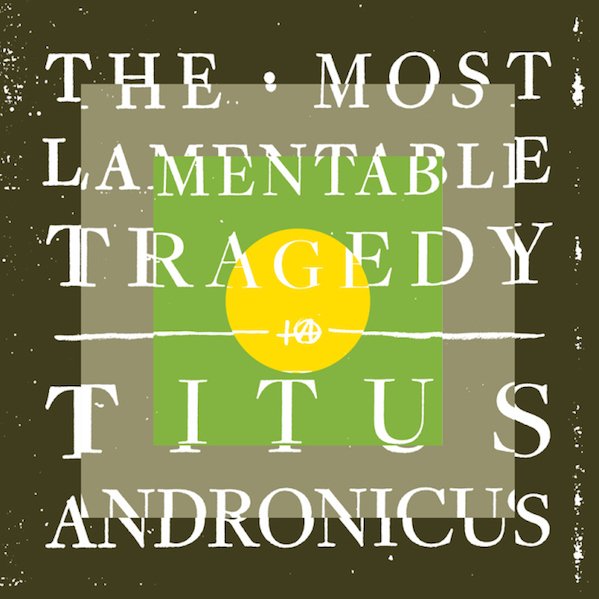Review | Titus Andronicus battle personal demons with the glorious feature-length rock opera ‘The Most Lamentable Tragedy’
Titus Andronicus![The Most Lamentable Tragedy -Headstuff.org]()
The Most Lamentable Tragedy
[Merge]
The concept album can be dangerous territory for the contemporary rock band. As Muse have already shown this year, going down this route can make a band sound obliviously pretentious, increasingly irrelevant and display “Jet fuel can’t melt steel beams” levels of baseless, political paranoia. The punk concept album is perhaps even more perilous, considering that the genre came about – in part – as a response to the perceived artifice of heavily polished studio albums of prog-rock bands of the late 70s. And yet New Jersey outfit Titus Andronicus have just given us their second of the like in five years, the result of which is a mesmerising, mammoth of a record.
With 2010’s The Monitor, frontman Patrick Stickles used the events of the US Civil War as a framework to discuss, among other things, the tumultuous end of a relationship. You would have thought the group may have found it difficult to be any more ambitious. Enter this year’s The Most Lamentable Tragedy, a 93-minute Rock Opera, told across five acts, about the life of a manic depressive. The narrative isn’t always easy to grasp but in basic terms it goes as follows: Our despondent hero wakes up, discovers his double, meets girl, loses said girl and it all ends in death (it is after all, a tragedy).
Punk song structures are usually quite straightforward but this is an undertaking that’s anything but. To call this just a punk album, however, perhaps doesn’t do it justice. Over the course of TMLT’s lengthy running time, we hear mournful piano ballads, 80s-esque synths, Thin Lizzy-style riffs and even a track consisting of only a man and his accordion. This is all without even mentioning the veritable host of musical allusions, both to other artists and the band’s past work, and intertextual references, both high and lowbrow that permeate the album. It’s only Stickles’ gravely, unwieldy voice that keeps the punk aesthetic present throughout.
[iframe id=”https://www.youtube.com/embed/0dX6LL7b8Y0"]
Don’t get me wrong, the aggressive fist-pumpers are still here. You’d even be forgiven for missing out on all the self-loathing and internal anguish when the songs are this breathlessly entertaining and the singer is this inaudible (lyric sheets will be needed). The Most Lamentable Tragedy opens with eerily chaotic synths of instrumental track ‘The Angry Hour’ until Our Hero is woken by the jolt of the ferocious ‘No Future Part IV’. In an excellent first act that concludes with the jaunty ‘I Lost My Mind’, Our Hero recounts the intense isolation he feels, his disconnect with the outside world in addition to the institutions and over-prescribed drugs that have made him the unfeeling husk he has become.
With the arrival of the double on the half-minute ‘Lookalike’, things get trickier as the two voices seem to merge and the identity of the speaker becomes blurred. Just like in the classic Dostoevsky novella, the origins and meaning behind the doppelgänger – whether it is to be taken literally or as some suppressed manifestation is up to you – is decidedly ambiguous. At times, though, the music can play second fiddle to the ambitious narrative. The two nine-minute plus tracks do little to justify their length and feel like they exist more for their expositional purposes than anything else. Stickles seems to be channelling the spirit of a Brian Wilson or Kevin Shields here, that of the troubled genius who painstakingly curates a work of formidable vision. Whereas his predecessors created escapist pop and lush soundscapes, Stickles actually addresses what’s troubling him. Lyrics like “Since then it’s been a struggle just to stay alive / Suicide seems superior than trying to survive” really do speak for themselves.
That being said, it’s not all doom and gloom. Although these songs are meant to be part of a coherent whole, there are those like ‘Fatal Flaw’ that can work on their own as anthems or could even be hits of a bygone era. Standout ‘Dimed Out’ is a pulsating ‘does exactly what it says on the tin’ Clash-like homage about, what else, wanting everything to the max. ‘Come On, Siohbán’ evokes The Pogues and makes unrequited love sound like a whale of a time (while also finally giving some country lads something to drunkenly sing to their coy girlfriends).
Albums of this scale, scope and laced with this much ballsiness don’t come around this often and we shouldn’t take it for granted. It’s not perfect, but records the lengths of your average Pixar movie almost never are. It’s also not surprising that this is a band and album that share a namesake with a work from history’s most famous playwright. ‘Shakespearian’ might be the only word to describe it.


